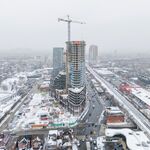Northern Light
Superstar
I think that's a bit more complex. People on very low income, who cannot afford a car at all, would benefit from the expansion of public transit and won't lose anything from road tools etc. On the other hand, there exists a sizeable group of "working poor" who can afford cheap cars, often second-hand, and who must use the car to earn their income. Either their daily trip to work is impractical by any means other than a car, or driving a car is part of their job.
Not to be bluntly against the road tolls, but there are some nuances here that need to be taken into account.
Of course, transit users pay tolls; we call them 'fares'.




